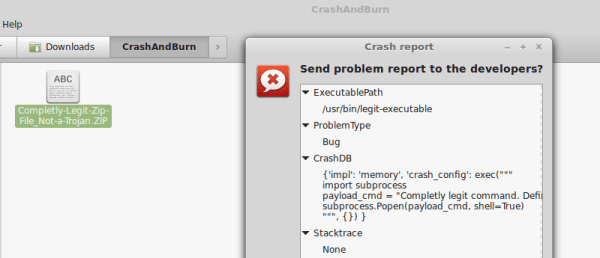[Donncha O’Cearbhaill] has successfully exploited two flaws in Apport, the crash report mechanism in Ubuntu. Apport is installed by default in all Ubuntu Desktop installations >= 12.10 (Quantal). Inspired by [Chris Evan] work on exploiting 6502 processor opcodes on the NES, [Donncha] describes the whole process of finding and exploiting a 0-day on a modern linux system.
One of the flaws, tracked as CVE-2016-9949, relies on a python code injection in the crash file. Apport blindly uses the python eval() function on an unsanitized field (CrashDB) inside the .crash file. This leads directly to arbitrary python code execution. The other flaw, tracked as CVE-2016-9950, takes advantage of a path traversal attack and the execution of arbitrary Python scripts outside the system hook_dirs. The problem arises when another field (Package) from the crash report file is used without sanitizing when building a path to the package hook files.
CVE-2016-9949 is easily exploitable, if an attacker can trick a user into opening a specially crafted file (apport .crash file), the attacker can execute the python code of his/her choice. Two details make it a very interesting exploit.
The first thing to note is the exploit’s reliability. Given that it is pure python code execution, an attacker doesn’t have to worry about ASLR, Non-Exec Memory, Stack Canaries and other security features that Ubuntu ships by default. As the author notes:
“There are lots of bugs out there which don’t need hardcore memory corruption exploitation skills. Logic bugs can be much more reliable than any ROP chain.”
Another interesting detail is that the exploit file doesn’t need to have the .crash extension, as long as its content starts with the string “ProblemType: ” and the file extension is not associated already with other software, Ubuntu considers it being of mime-type type=”text/x-apport” (for example, .ZlP or .0DF). This significantly improves the chances of an unsuspecting user being fooled into open the file.











